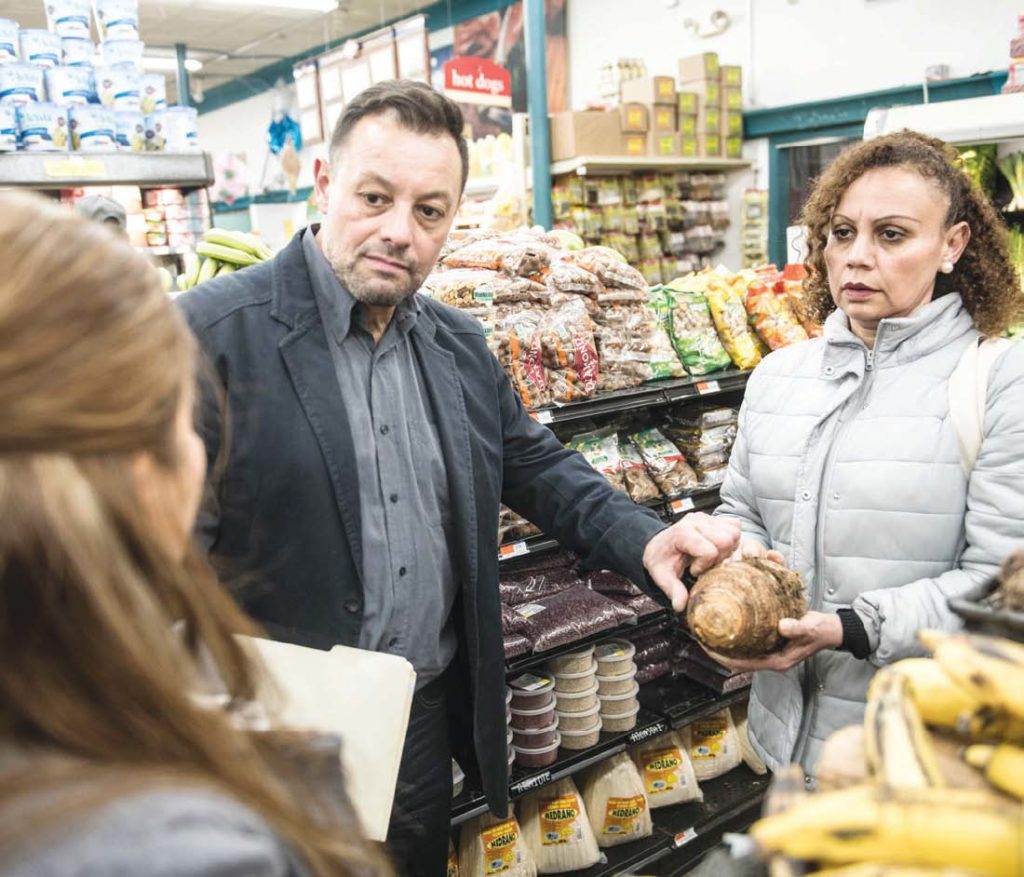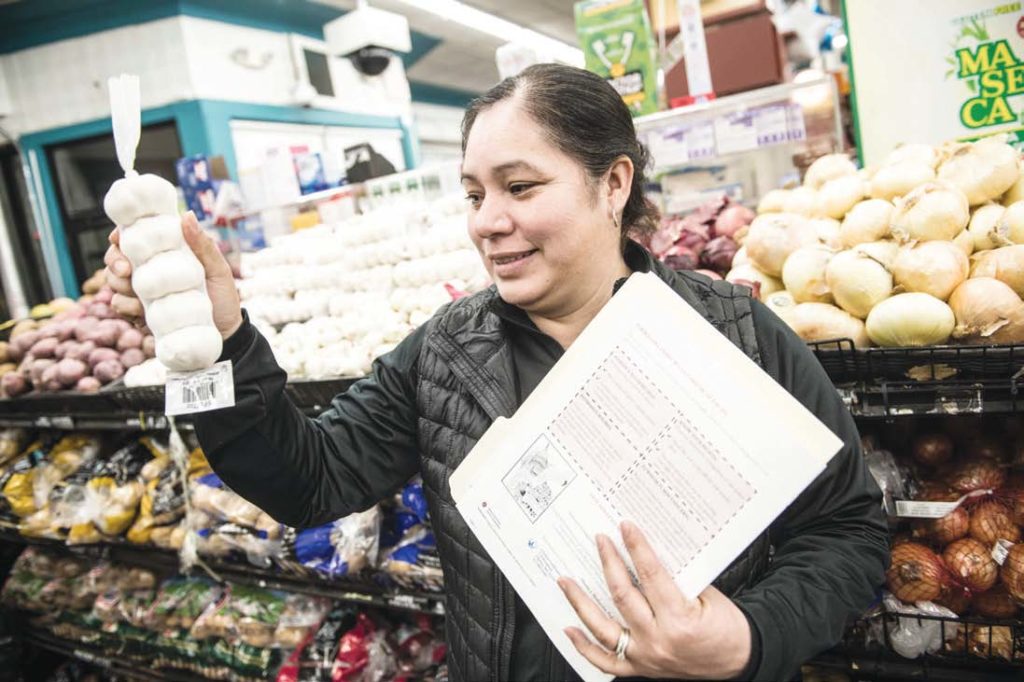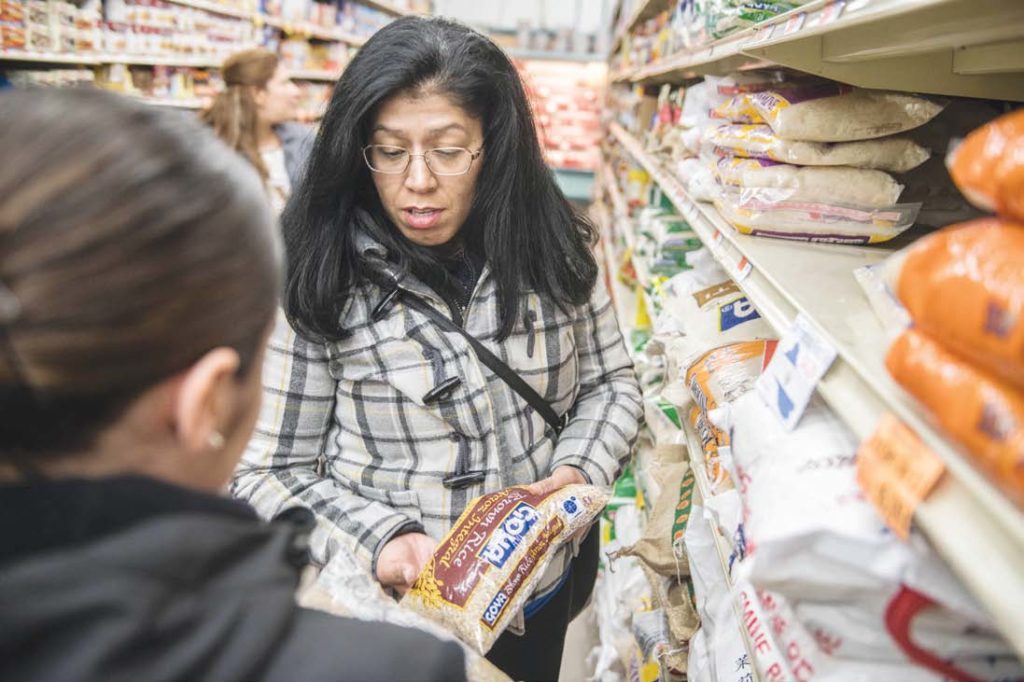When Jose Barriga was working as a translator at an area hospital, he routinely saw a cycle of poor health from his Latino patients that seemed to be caused by the food they ate.

meal using the new techniques and ingredients.
Many of them new to the country, or having come as adults, food and cooking and daily life was far different than in their native countries. Yet many still cooked and ate in the same ways that they did when they lived at home.
Doctors suggesting that patients give up their traditional food was a non-starter, even if they agreed to it at the hospital.

Below, Leslie Garcia examining Goya brown rice with Grisalda Valesquez.

At the same time, Barriga saw that something did need to change, but maybe not altogether.
That’s what bore the idea of the Cocinas Saludables program in Chelsea, which is in its second year and is a partnership with the Cambridge Food Lab, Chelsea Collaborative, and Healthy Chelsea.
“What I realized when I was interpreting is there is a big problem in communication between health care providers and the Latino community,” he said. “A doctor will say you need to change how you eat, usually suggesting to cook brown rice or eat other foods. They have the best interests, but the language is not effective. I was seeing a cycle. I saw mothers with diabetes bringing children who were overweight. The issues they were having in large part was due to the foods they were eating or their cooking techniques. This is a huge, huge problem from a public health perspective in the Latino community.”
What Barriga and the other partners are trying to do is create the best of both worlds.
They’re looking to have their arroz con habichuelas, and eat them too.
Anais Caraballo of the Collaborative said they are excited to host the class for a second year, and said she sees a great value in educating people on how to cook traditional foods in a more healthy manner.
“I think it’s very important coming from a Puerto Rican background,” she said. “It’s a great program to have the community become more aware of healthier ways to eat and cook, but at the same time still be able to enjoy cultural foods that are an ingrained part of their lives.”
On Monday, Barriga and a class of 10 people met in the Collaborative to talk about foods and cooking and how people thought about food. That was followed up with a trip to Stop & Compare – a loyal partner to the program. There, those in the class walked through the aisles with Barriga to look at ingredients in their traditional foods.
Armed with materials from their class, and the advice of Barriga, they looked at the ingredients they usually buy, and considered alternatives that were healthier. In that sense, they didn’t have to give up the foods that meant so much to them, and they could also ensure they were eating healthy.
Barriga said he customizes the class according to the culture. If there are a lot of Caribbean cultures in the class – such as Puerto Ricans – he will discuss different ways of cooking aside from frying – as well as using healthier oils when cooking the food.
“When it comes to the Caribbean community, it’s talking about fried foods, which is a constant in the Caribbean diet,” he said. “My proposal isn’t to be 100 percent healthy options. If you come and say you have to change everything you eat, people won’t do it. I give them a couple of changes that will help their overall health in the long run. I try to be realistic. For the Caribbean cultures, I tell them to avoid fried foods sometimes, and try to sauté a little more so they use less oil.”
Another issue is that many people who have just come from outside the United States arrive and find food cheaper and more accessible. For example, a family in El Salvador may only have had meat one time a week. However, in the U.S. they find they can have it seven days a week, and they do that.
“If you grow up poor and food was a problem, then you come to the U.S. and food is plentiful,” he said.
That is also true when it comes to activity.
Many people had a similar diet in their home countries, but they often had to walk or bicycle many miles each day just to do simple tasks. That active lifestyle and different climate helped to regulate their diet.
Once here in Chelsea, they find themselves far less active and in a climate that is inhospitable to them six months of the year.
“I call that the food-culture clash,” he said. “They have no cars in many Latin American countries. They walk or they bike. People come here and they get overweight because it’s very comfortable. They drive and there is a lack of physical activity, which is a major symptom of being overweight.”
Next Monday, students in the Cocinas class will gather the remainder of their ingredients and cook up traditional foods with a healthy twist.